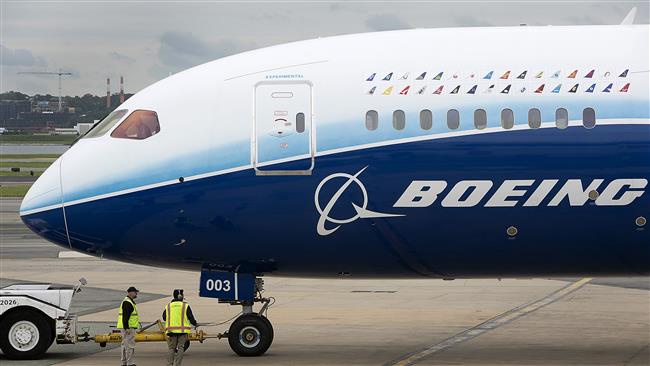On January 17, Rep. Peter Roskam (R-IL-6), along with Reps. Lee Zeldin (R-NY-1) and Brad Sherman (D-CA-30), introduced H.R. 566, the “Terror-Free Skies Act”. This legislation would violate the nuclear accord and isolate the United States on the international stage. The bill would re-impose sanctions lifted under the Joint Comprehensive Plan of Action (JCPOA) – specifically, by re-imposing blocking sanctions on Iran Air and other commercial Iranian airlines. This legislation would also risk nullifying licenses issued to Boeing, Airbus, and other aircraft manufacturers to export civil aircraft to Iran in contravention of U.S. obligations under the JCPOA.
H.R. 566 would require the President to submit a report to Congress on a biannual basis regarding the use by the Iranian government of commercial aircraft for illicit purposes. The report would take a retrospective look at Iran’s activities starting with the date 5 years prior to the date of H.R. 566’s enactment and would describe the extent to which:
- Iran’s government has used commercial aircraft – including those of Iran Air – to transport illicit cargo to or from Iran, including military goods, weapons, military personnel, military-related electronic parts and mechanical equipment, or rocket or missile components;
- Iran’s commercial aviation sector – including Iran Air – has provided financial, material, or technological support to the IRGC, MODAFL, the Assad regime, Hezbollah, Hamas, Kata’ib Hezbollah, or any other FTOs or entities designated on the SDN List; and
- Foreign governments or entities have facilitated the illicit activities of Iran’s commercial aviation sector, including allowing the use of airports, services, or other resources.
Upon the President’s determination that Iran Air or any other Iranian commercial airline has used commercial aircraft for such illicit purposes on or after JCPOA Implementation Day, the legislation would mandate the President to designate such airline as a Specially Designated National (SDN). It is unclear under which sanctions program the President would designate any such airline, but such designation would – at a minimum – impose blocking sanctions and would broadly prohibit U.S. persons from engaging in any transactions with the entity.
In doing so, the United States would be in violation of the JCPOA on two separate grounds:
First, designating Iran Air or any other Iranian commercial airline for which sanctions were lifted under the JCPOA would be fairly regarded as an effective re-imposition of the sanctions-lifted under the JCPOA in violation of § 26 of the JCPOA’s Main Text, which states that “[t]he U.S. administration…will refrain from re-introducing or re-imposing the sanctions specified in Annex II that it has ceased applying under this JCPOA…” § 4.8 of Annex II of the JCPOA commits the United States to remove the individuals and entities listed in Attachments 3 and 4 to Annex II of the JCPOA from the SDN List – the effect of which would be to “ceas[e] the application of secondary sanctions for transactions with [such] individuals and entities” and to “unblock[] [the] property and interests in property within U.S. jurisdiction for [such] individuals and entities…” Iranian commercial airlines – including Iran Air – were included on this list. Designating such airlines could trigger the re-application of secondary sanctions and would re-impose blocking sanctions, in contravention of the JCPOA.
Second, by designating Iran Air or any other Iranian commercial airline as an SDN, the United States would likely renege on its JCPOA commitment to allow for the sale of commercial passenger aircraft to Iran. Specifically, § 5.1.1 of Annex II of the JCPOA obligates the United States “to allow for the sale of commercial passenger aircraft and related parts and services to Iran.” The U.S. administration has carried out its commitments under this subsection by specifically licensing Boeing, Airbus, and other aircraft manufacturers to export commercial passenger aircraft to Iran.
To ensure that Iran does not utilize U.S.-origin aircraft for illicit purposes, the JCPOA stipulates that the U.S. government will grant licenses to Boeing and Airbus for the export of civil aircraft to Iran so long as two conditions are met: (1) such aircraft is not re-sold or re-transferred to SDNs; and (2) such aircraft is not used for purposes other than exclusively civil aviation end-use. If Iran fails to meet any of these conditions, then the U.S. “would view [such failure] as grounds to cease performing its commitments under § 5.1.1 in whole or in part.”
H.R. 566 would likely lead to the revocation of the licenses issued for the export of commercial passenger aircraft to Iran even if an Iranian commercial airline did not violate these conditions. § 5.1.1 of Annex II of the JCPOA is primarily concerned with the uses to which Iran’s commercial airlines make of the licensed aircraft. The JCPOA’s drafters did not envision a circumstance in which Iran Air would not violate either of the two conditions enumerated in Footnote 12 of Annex II of the JCPOA, but would be (re)designated an SDN and placed on the U.S. sanctions list. H.R. 566 allows for such an eventuality. If passed, it could lead the incoming administration to re-designate Iran Air and revoke existing licenses for the sale of aircraft to Iran, as such licensed activities would now involve an SDN. In this manner, the U.S. would cease the performance of its JCPOA commitment, all the while inviting Iranian counter-measures and estranging itself from its P5+1 partners.
It should be noted that Rep. Roskam is an avid opponent of the nuclear deal with Iran. He led legislative efforts to formally disapprove of and block the implementation of the JCPOA shortly after it was secured in July, 2015. In the previous Congress he introduced multiple pieces of legislation that would block or undermine the licensing of commercial aircraft to Iran under the JCPOA.
